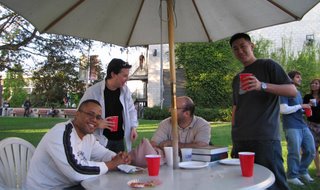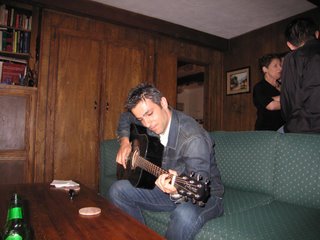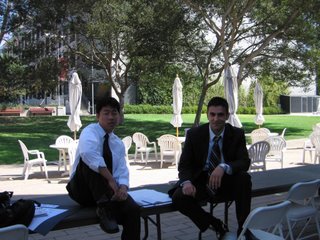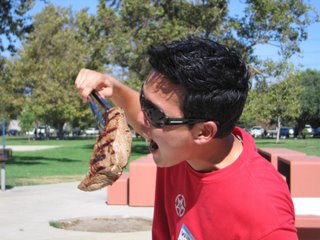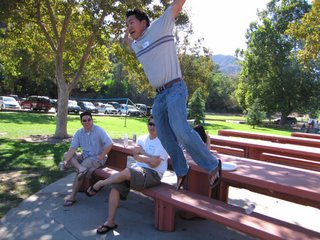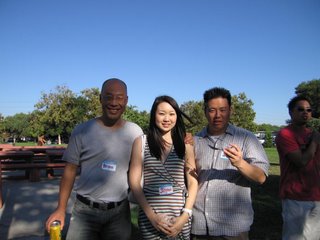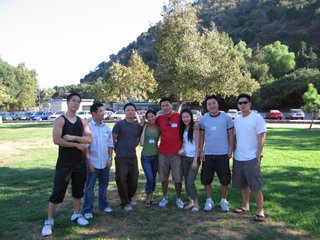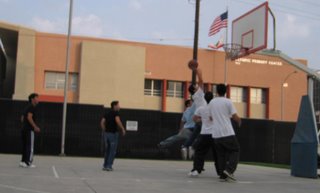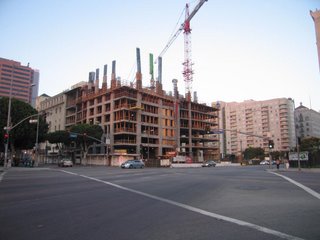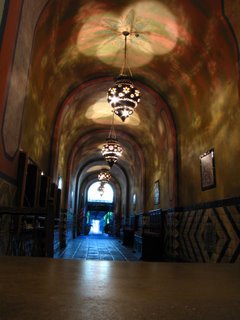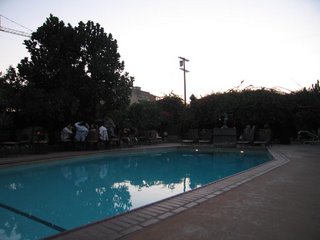APALSA is expanding! On Friday 20 October 2006, the Loyola Law School APALSA got together with similar law student associations from other schools, including at least Southwestern Law School and UCLA for a mixer event at Ma'Kai in Santa Monica.
Sunday, October 22, 2006
Accountability
On Monday, the second-year day students began to register for classes for the next semester. First year students and second-year evening students were auto-registered for their classes, and more advanced students got priority because they were closer to graduation, so they needed to fulfill their requirements.
The time was 7am. Hundreds of sleep-deprived souls logged onto the registration website. We entered our passwords, and clicked on the "Registration" tab. We were told we were ineligible. Puzzled, we thought that perhaps the clock on the server was running behind. Every minute, we refreshed.
By 7:10, students were calling each other and IM-ing each other. On AIM, a chatroom was created, and students went there to vent. The tension was palpable. People were calling the Registrar's office and the Dean's office. Nobody was picking up.
At one point, one of the students relayed a message to the chatroom from one of his friends, who had figured out a way to get the registration program to work. The workaround was to paste a javascript command into the address bar of the browser. Apparently, although the application did not give us the link to the add/drop classes function, it did not prevent us from seeing the javascript function for modifying classes in the current semester. The student who figured out the workaround basically took a look at the javascript command for modifying classes in the current semester, and changed two parameters, one of which simply stated the year and the semester. It was a brilliantly simple workaround.
As the news spread throughout the chatroom, people tested the workaround and confirmed their success. The excitement raced through the room, and students began IM-ing, e-mailing, and calling their friends to let them know about the workaround. It was a simple matter to dig up old e-mail lists that addressed entire sections from first year, and use that to spread the knowledge. People were elated.
As the day went on, however, the Registrar finally got wind of what was going on, and clamped down. Registration was rescheduled for Tuesday, again at 7am. The e-mail went out at 9am. I quickly jotted off a note to Dean Burcham, expressing my disappointment with the performance from the IT Department and the Registrar's Office. I wrote the following:
Dean Burcham,
I was very disappointed by the events of this morning. Many students cut back on their hours of sleep just to wake up in time to register for classes. For over half an hour, we worried about what to do. One student found a solution that worked. The solution was fairly obvious, and reminded me of a workaround that was used in June for about a month by those of us who were trying to figure out what our grades were so we could update our resumes. I.e., the solution required only some insight, but no genius.
Those of us who tried the solution then tried to help as many other students as we could. There was a great deal of satisfaction for those of us who were able to help others. This, I think, is truly the spirit of what we're trying to learn: Figure out what the rules are, succeed by those efforts, and help one's fellows. It was truly the best of our nature.
But now, we are told, all our efforts are for naught, and we all have to curtail yet another night's sleep. All this, for something on which the IT Department completely dropped the ball.
This is not the first time ITD has come up short. Others include:
- The wireless outage that lasted half of Spring 2006.
- The inability of students to see their grades during June.
- The breakdown of events-mail.
All three of these occurred during 2006. In the same calendar year, tuition has gone from about $30,000 to about $34,000. While tuition hikes are to be expected, and minor glitches in IT are not completely out of the ordinary, the combination of debilitating breakdowns in IT and the higher rates causes one to wonder whether or not the IT Department, as it currently stands, is worth the money we spend on them.
I am writing only as myself; but I think I'm probably not the only one disappointed and upset by this experience. I don't think it's an answer to say, "oops, we messed up." I don't think it speaks well of the university to say that students who had the insight to figure out a way to get something accomplished, and then help their fellows, should now effectively be punished for their intelligence and their compassion. It is unacceptable, and it is contrary to the spirit of Loyola Law School.
The Dean expressed his disappointment at the performance as well, but stood by the policy of making everyone get up again at 7am the next day to register for classes. I understood that just fine. In fact, as I went to the library to study, I ran into a classmate who had overslept, and was cutting class just to go to the library to register. When I told her that would be no registration at all that day, she was elated. And I wouldn't want to take that away from her.
Still, quite apart from the question of "fairness" was the question of accountability. I replied to the Dean thus:
Dean Burcham,
I doubt that the concern is with the fairness of resetting things for the benefit of those who did not have the work-around. Coming into the library, I spoke with one student who was on the verge of breaking down because her computer had broken down at home, and she thought she wasn't going to be able to get the classes she wanted. She skipped class to go directly to the computer lab; but once I told her what had happened, she was elated, and could go do her reading. In the same spirit with which those of us with the workaround tried to help others, we would not want to deny fairness to those who did not have the workaround.
What primarily concerns me at this point is more of an accountability question. This also relates to the matter of tuition. Speaking with a couple of other people who have computer backgrounds, we noted that the registration system, as currently implemented, is open not only to workarounds for human error, but also possibly to abuse. (This is only speculation; nobody I spoke to had enough energy after getting through registration to figure out how further to exploit the web system.) Again speaking for myself, I consider it beyond disappointing that there have been so many breakdowns with IT.
To put it plainly: What are we getting with the money we pay into IT?
Human error is understandable. But when tuition has gone up faster than inflation, much else remains at its excellent level of quality, but IT is noticeably impaired, particularly compared with the previous year, it is only reasonable to wonder what we're getting for our money.
Finally, around 4pm, the Registrar sent out another e-mail, stating that all registration activity that was logged between 7am and 1pm that day would be purged, implying that nothing was done to prevent the workaround for about 6 hours. Sure enough, when I logged on to the school intranet, the "Registration" tab was gone. But, as someone pointed out, the "View My Schedule" tab was still available. I clicked on that, and then the "View All Enrollments" link, and all the classes I had signed up for were still listed. I guess the "purge" wasn't going to happen.
When I checked again a couple of minutes later, however, the classes were gone. Still, the page was similar enough to the "Registration" tab that I decided to give the workaround another try. It worked. I quickly spread the news to a few people.
Finally, around 6:30pm, the Registrar and IT disabled the entire registration website.
The next day, at 7am, hundreds of students again gathered in front of their computers. Those for whom the site loaded in less than 30 seconds saw that they were still ineligible to register for classes. A mad fury of refreshing began.
The Stud made it through on the first refresh, and was able to sign up for classes. By 7:02am, the Stud was done.
But the debacle took its toll. Thousands of student-hours of sleep, and thousands of student-hours of reading, were wasted as students spent Monday morning trying to figure out if the Law School Gods were, in fact, crazy.
The Stud attended the Dean's Forum on Tuesday to speak about the total breakdown of communications, and (unfortunately) of courtsey (on the part of the Registrar). The Dean attempted no defense, and apologized profusely.
Tuesday has come and gone, and registration is complete. But for many students, it was a bitter experience. More than one student who found out about the workaround late on Monday did not get the classes they wanted on Tuesday, because the site took too long to load, and they could not get signed up for certain classes in time.
Saturday was the PILF Auction, which brought together faculty and students for an essentially charity event. But more needs to be said by the IT Department and the Registrar's Office before second-year students can really appreciate them again. An official mea culpa is needed.
Where is the accountability?
Monday, October 16, 2006
Turf Club - Part VII
The second Turf Club of the 2006-07 school year was much improved on the previous one. With two kegs, smaller cups, and fewer first years (who were mostly busy studying for recovering from midterms), there was much more of everything to go around. Moreover, this time the event was set up on the basketball court. While that meant no more high-flying stunts of the sort that took place after the previous Turf Club, at the same time there was much more room for people to move around and mingle.
In fact, a few members of the 2005-06 Section 2 had a mini-reunion.
By the way, congratulations to the 1Ls for finishing a grueling two weeks, during which midterms and memos came due. Don't let up the pace now!
ILS Potluck
Coming a little bit later this year than last, on Sunday 8 October, the International Law Association (ILS) nonetheless did not forget the tradition of having a potluck at Professor Friedler's home in San Marino. Much food was brought, which apparently caused the ILS President, Vakhe Khodzhayan, to burst into song:
Yours truly also participated in the festivities.
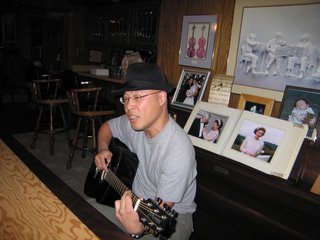
Incidentally, Professor Friedler made a fantastic sangria, of which yours truly partook. Not saying there's a causation or anything.
Tuesday, September 26, 2006
Byrne Trial Advocacy Team
On Saturday 16 September, 43 ambitious law school students competed for the right to enter the finalist round of competition for a set on the 2006-2007 Byrne Trial Advocacy Team. It was a grueling competition; only 16 were selected to go to the final round. Of the two fine gentlemen here, both articulate speakers, one made it to the next round (the dapper young man in the full suit). Neither made the final roster.
Congratulations to the men and women who made it onto the team: Michael Abed, Malaika Clements, Danielle DeSmeth, Gavin Doyle, Terrence Jones, Hooman Kazemi, Anand Kumar, Prateek Lal, David Palmer, Gautam Sood, and Sara Yin. Sara represents 2005-2006's Section 2.
Best of luck to the team as they take on the nation's best throughout this year!
Monday, September 18, 2006
APALSA BBQ at Griffith Park
As the summer days wound down, the Asian Pacific American Law Student Association (APALSA) held its annual welcome BBQ at Griffith Park. Here are snapshots of some of the moments:
The spread:
Will Choi about to bite off more than he can chew!
Brian Jun is extremely happy about the amount of meat!
The Stud with his mentors, J-chizzle and Sam:
The APALSA Board: Charles Lin, Ed Yun, Pete Hong, Alice Chen, Will Choi, Cathy Kim, Hee Sung Yoon, and Danny Yoo.
APALSA has also organized a presence on Westlaw as a TWEN course. Add APALSA for more information on future events.
Friday, September 15, 2006
Turf Club - Part VI
Turf Club started back up this semester. Rumors are that there will be fewer of them this year.
For this first Turf Club of the school year, Westlaw came out as a sponsor, along with their nice big cups. The cups, unfortunately, had the effect of draining the keg of beer a lot quicker than the usual party cups that Turf Club usually uses.
In addition, the even was much better advertised, and quite a large number of students turned out in the waning days of summer.
Afterward, a few students decided to indulge in a pick up game of basketball.
Saturday, August 26, 2006
Welcome Back at Hotel Fig
Each year, the Loyola Law School Student Bar Association arranges to have a Welcome Back party at nearby Figueroa Hotel at 939 South Figueroa Street, also better known as Hotel Fig. When I had gone last year, I knew only a few people, and met perhaps two second year students. This year, the turnout seemed bigger, and I definitely mingled with many more people.
Heck, one first year (who shall remain anonymous) even came up to me and asked if I remembered her from a birthday party I had attened last year. Fortunately, now that she's a student, I'll have less excuse to forget.
The walk over from school is a short one. The major cross-streets are Figueroa (of course) and Olympic (this is a view from the southwestern corner):
Hotel Fig looks small-ish at first, but the pool area, which is where the party was, is through this hallway:
At the last light of day, the party had yet to get going. Once things got swinging, though, the pool area was standing room only. Much fun was had.
It was great to see all the advanced students again. Welcome back, and a hearty welcome to all the first years who found time to join us at the party. This is only the beginning of a journey, and you'll find fellow travelers along the way that, with some luck, will be traveling with you far beyond law school.
Friday, August 25, 2006
ExTORTion
For those who are interested in a career in tax law or even personal injury law, the D.C. Circuit has ruled that non-physical personal injury (emotional distress, loss of reputation) compensation unrelated to lost wages and earnings is not "income" within the meaning of Amendment XVI, rendering § 104(a)(2) of the Internal Revenue Code unconstitutional. This would appear to be a win for the "little guy".
TaxProf Blog has more.
Thursday, August 24, 2006
Advice for Rising 2Ls
Ian Best at 3L Epiphany has posted some advice for those of us beginning our second year at law school.
Monday, August 21, 2006
Back to School
It is Monday 21 August 2006, and it's time to go back to school! The Stud will be starting second year today; this semester's classes are Constitutional Law II, Evidence, Ethical Lawyering, and International Intellectual Property. It's been a fun summer, but it's time to get serious again, and aim to do better this year than the previous year.
For the students beginning their first year, Austin Groothuis has some advice for new students. Also, blog pal Mad Minerva sends a link to a PDF file at the Volokh Conspiracy; the file contains advice on how to read a judicial opinion.
Best of luck, everyone!
Wednesday, August 16, 2006
Outlines
I've been playing with directly pasting portions of my outline into Blogger instead of doing the formatting by hand. I figure, if Word has already gone to the trouble, who am I to argue?
So far, I've just updated the Civil Procedure Outline; I'll try to get the rest done before school starts up again.
Outline - Civil Procedure - X - Trial Process
Civil Procedure (2005-2006)
X. TRIAL PROCESS
A. Rule 56 – Motion for Summary Judgment (Mo4SJ)
1. Standard – No genuine issue of material fact, and movant entitled to judgment as a matter of law
a. “Material fact” – essential element of claim or defense
b. “Genuine issue” – Actual (objective) and good faith (subjective) controversy; dispute is one which a reasonable jury could resolve in favor of nonmovant. Note: The fact a jury might disbelief a witness is not a “genuine issue”.
2. Policy – For efficiency, eliminate claims and defenses that would not survive Mo4JMOL.
3. Adickes v. S. H. Kress & Co. – Restaurateurs defending against conspiracy claim by white woman who came in with black girls not entitled to summary judgment where evidence does not establish absence of genuine issue, even where no opposing evidence is presented
a. Movant bears burden of showing absence of dispute of fact, so any scintilla of evidence that a jury could interpret in favor of non-movant defeats Mo4SJ
b. Judge should not weigh evidence or assess credibility, but take all possible inferences in favor of non-movant
4. Celotex Corp. v. Catrett – Where movant plaintiff had no evidence on an essential element of case, could not have survived Mo4JMOL, no trial needed, summary judgment proper
5. Moving party’s burden of establishing absence of “genuine issue” [Celotex Corp. v. Catrett, Brennan, J. dissenting]:
a. Initial burden of production (shifts to non-movant is satisfied by movant):
i. if movant has burden of persuasion at trial, must support with credible evidence
ii. if non-movant has burden of persuasion at trial, movant may satisfy burden of production by:
a) submitting affirmative evidence negating essential element of non-movant’s claim; or
b) demonstrating non-movant’s evidence insufficient to establish essential claim, through lack of affirmative of evidence, or through admissions, interrogatories, and other on-record exchanges between parties
b. Ultimate burden of persuasion
6.
B. Burdens
1. Pleading
a. What must go in a pleading: notice pleading for most, heightened pleading for Rule 9
b. Who must put it in pleading:
i. Plaintiff: claims or affirmative defenses to counterclaims
ii. Defendant: counterclaims or affirmative defenses to claims
2. Production
a. Movant without burden of proof must show non-movant cannot prove element of claim/defense, either with evidence negating or by pointing to absence of recorded evidence
b. non-movant with burden of proof must show evidence from which a reasonable jury could find for it
3. Proof
a. Level of proof required to persuade fact finder of elements of claim, damages or defenses (in most civil cases, preponderance)
b. Follows burden of pleading in parties burdened
C. The Jury
1. Right to Trial by Jury
a. Where not available by Constitution, can be granted by Congressional statute
b. Decided by issue, not by case
2. Historical Test [Curtis v. Loether – Landlord who refused to rent to black women in violation of Civil Rights Act entitled to jury trial]:
a. Law or equity?
i. Which court would have tried the case before 1791?
ii. If unclear, reason by analogy.
b. If legal, what type of relief sought?
i. Compensatory damages are legal relief; jury trial
ii. Where statute specifies remedy is equitable, no jury right
a) back pay as restitution is equitable, awarded by judge
b) some causes of action existing in 1791 without monetary relief were at law
c) jury decides whether to impose civil penalties but judge decides amount
c. Complexity test: Practical abilities and limitations of juries? [Markman v. Westview Instruments, Inc.]
3. Mechanics
a. Waivable; must be demanded in pleadings or within 10 days of last pleading on issue
b. Any party can demand; cannot withdraw demand without consent of other parties
c. Due Process default minimum of 6 (waivable)
d. Unanimity required unless by consent
4. Rule 50 – Judgment as a Matter of Law (Mo4JMOL)
a. Mo4JMOL at close of plaintiff’s case-in-chief tests whether plaintiff met burden of producing at trial sufficient evidence for a reasonable jury to find for plaintiff on each element of his claim.
b. Mo4JMOL at close of defendant’s case-in-chief tests same as to defendant’s affirmative defenses.
c. Mo4JMOL at close of evidence and renewed Motion for JMOL: taking all reasonable inferences from evidence at trial in favor of non-movant but uncontradicted, unimpeached evidence from disinterested witnesses in favor of movant, no reasonable juror could find for non-movant.
D. Motions Flowchart
1. Pretrial
a. Plaintiff Mo4SJ. High standard of persuading judge that defendant will be unable to produce sufficient evidence at trial to survive Mo4JMOL. (see 2-b-i)
b. Defendant Mo4SJ. Must show plaintiff will be unable to satisfy burden of production, so that defendant would succeed on Mo4JMOL. (see 2-a-i)
2. Trial
a. Plaintiff presents case. At end of evidence, determine if burden of production met.
i. No: Defendant Mo4JMOL. (see 1-b)
ii. Yes: Case proceeds.
b. Defendant presents case. At end of evidence, determine if evidence sufficient to rebut essential element of plaintiff’s case.
i. No: Plaintiff Mo4JMOL. (see 1-a)
ii. Yes: Evidence closes.
c. If burdens of production met, case goes to fact finder.
E. Preclusion
1. Claim Preclusion – Res judicata
a. Conditions
i. Valid final judgment in first forum
a) Notice
b) SMJ
c) PJ
ii. Same parties
iii. Same claims
b. Cases
i. McConnell v. Travelers Indemnity Co. – Where state law forbids splitting torts claims, dismissal with prejudice in state court of one part of claim precludes the other part in federal court.
ii. Federated Department Stores v. Moitie – Where plaintiff loses in federal court and does not appeal, then files again in state court, and defendant removes to federal court, dismissal for claim preclusion is proper.
2. Issue Preclusion – Collateral Estoppel
a. Issue of fact
b. Actually litigated
c. Full and fair opportunity to be litigated
d. Final and valid judgment
i. Notice
ii. SMJ
iii. PJ
e. Issue was essential to judgment
[lawschool] [outline] [civil_procedure] [due_process]
Outline - Civil Procedure - IX - Discovery
Civil Procedure (2005-2006)
IX. DISCOVERY
A. Rule 26(b)(3) – Work Product Protection
1. Opinion WP – May not discover impressions, opinions, or theories of attorney, unless there is extreme need and hardship:
a. probably never in cases for which WP was created
b. case-by-case determination whether the protection is overcome in subsequent litigation where opinions in WP are at issue
c. Holmgren v. State Farm Mutual Automobile Insurance Co. – Opinion WP may be discoverable and admissible where mental impressions are at issue in case and need for material is compelling
2. Ordinary WP – May discover other material prepared in anticipation of litigation only if there is:
a. substantial need (ordinary wear-and-tear on witness memories are not substantial need), and
b. undue hardship to obtain by other means
3. Hickman v.
B. Attorney-Client Privilege
1. Elements
a. Communication
b. Between client (or potential client) and lawyer (or lawyer’s representatives)
c. Without presence of others
d. For purpose of obtaining legal advice (not for purpose of committing crime or tort)
2. Only applies to communication, not facts
3. Privilege belongs to client, who can waive it
C. Attorney-Client Privilege for Corporations – Communications between attorney and employees is [Upjohn Co. v. United States – Corporation which policed itself not required to relieve IRS of its job]:
1. Needed for attorney to give legal advice to corporation
2. About information within scope of employee’s employment
3. Understood by employee to be for the purpose of legal advice to corporation
4. Understood by employee to be confidential
D. Other Privileges
1. Doctor-patient
2. Priest-penitent
3. Husband-wife
4. etc.
[lawschool] [outline] [civil_procedure] [due_process]
Outline - Civil Procedure - VIII - Supplemental Jurisdiction - 28 U.S.C. § 1367
Civil Procedure (2005-2006)
VIII. SUPPLEMENTAL JURISDICTION – 28 U.S.C. § 1367
A. Required Elements
1. “Trunk or “original” or “federal” claim over which the federal court has original SMJ (federal question, diversity, or “other”), and
2. “Branch” or “supplemental” or “nonfederal” claim is part of same case or controversy as trunk claim
a. “common nucleus of operative facts”
b. logical relationship between claims (broader than “same transaction or occurrence”)
B. Diversity Trunk Exception – If the trunk is solely based on diversity, and the following would destroy diversity:
1. Original plaintiff may not bring supplemental claims against persons made parties under Rule 14 (impleader), Rule 19 (compulsory joinder), Rule 20 (permissive joinder), or Rule 24 (intervention); and
2. New plaintiffs proposed to be added under Rule 19 (compulsory joinder) or seeking to intervene as plaintiffs under Rule 24 may not bring supplemental claims.
3. Owen Equipment & Erection Co. v. Kroger – Where case as amended impleaded defendant whose citizenship destroyed diversity, case must be dismissed.
4. Exxon Mobil Corp. v. Allapattah Services, Inc.
a. Plaintiffs joined under Rule 20 do not contaminate case
b. Non-diverse plaintiff class members under Rule 23 do not contaminate case
C. Discretion to Decline Supplemental Jurisdiction
1. Novel or complex state law
2. Supplemental claim predominates
3. Original trunk claims dismissed
4. Other compelling reasons in exceptional circumstances
D. Statute of Limitations Tolling Provision – Tolls SoL for supplemental and related claims for 30 days after dismissal to give claimant opportunity to re-file in state court
E. Flow Chart
1. If independent SMJ exists for each claim, no need to analyze under 1367
2. If no independent SMJ exists for each claim, analyze under 1367 only if trunk satisfies independent SMJ
3. Analyze branch claims under 1367(b)
a. If defendant was joined under Rule 14, 19, 20, or 24, no supplemental jurisdiction
b. If plaintiff joined, analyze under Exxon (Rule 20, 23 plaintiffs okay as long as one member meets diversity)
c. Under 1367(c), court may exercise discretion
[lawschool] [outline] [civil_procedure] [due_process]
